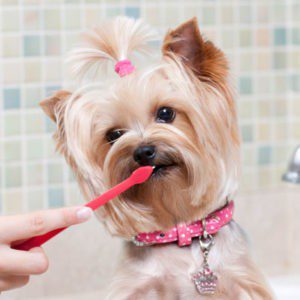Did you know that brushing your dog’s teeth is the best way to protect him from painful dental issues? Dental care is just as important for pets as it is for people. However, Fido may need a bit of coaxing to get on board with the process. A Bucks County, PA vet discusses brushing your pup’s teeth below.
Get The Right Products
Don’t use human toothbrushes or toothpastes on your pooch. Our toothbrushes aren’t angled the right way for dogs, and our toothpastes may contain ingredients, like xylitol, that are dangerous for them. When picking toothpaste for Fido, choose a flavored one. This will definitely make things more pleasant for him!
Start Slow
You’ll need to get your canine pal used to having his teeth brushed. Start by gently massaging his gums and teeth. Work this into cuddle time. Once your pup is used to the idea, you can add a finger toothbrush. Then, move on to a real one. The last step is to incorporate that yummy toothpaste we just mentioned.
Rewards
When training dogs, it’s crucial for them to associate rewards with the desired behavior. What’s the best way to reward Fido? Snacks! Give your furry buddy something delicious after his dental care sessions. Praise and ear scritches are also important.
Routine
Dogs always thrive on routine. It will also be easier if Fido thinks of getting his teeth brushed as just a part of his daily doggy schedule. You don’t have to do your dog’s entire mouth every day. Do one section at a time, and keep rotating. He’ll still benefit!
Other Options
Some dogs just won’t tolerate having their teeth handled. There are other things you can do to keep those choppers healthy. Ask your vet for advice on using doggy dental products, such as dental flakes, oral rinses, and dental-formula treats and chews. These can all help fight plaque and tartar. Also, make sure Fido always has fresh water and suitable chew toys.
Examinations
Fido should have his teeth checked about once a year, starting in puppyhood. When you’re brushing his teeth, watch for signs of trouble, such as bad breath, tartar buildup, swelling, bleeding gums, and heavy drool. Call your vet immediately if you notice any of these red flags.
Do you know or suspect that your dog has dental issues? Contact us, your Bucks County, PA vet clinic, today!


